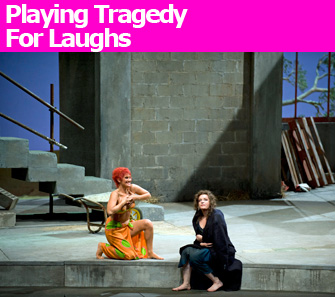 |
|
Zerbinetta (Jane Archibald) tries to convince Ariadne (Ricarda Merbeth) to lighten up a little. Photo: Julien Benhamou/Opéra national de Paris |
With Paris enduring its heaviest snowfalls in years last week and many motorists spending hours stuck in their cars, the onstage snowstorm that opened this production …
 |
|
Zerbinetta (Jane Archibald) tries to convince Ariadne (Ricarda Merbeth) to lighten up a little. Photo: Julien Benhamou/Opéra national de Paris |
With Paris enduring its heaviest snowfalls in years last week and many motorists spending hours stuck in their cars, the onstage snowstorm that opened this production at the Bastille opera house of Richard Strauss’s Ariadne auf Naxos must have seemed less charming to some spectators than to those, like myself, who managed to remain safely indoors during the worst of the weather. But, mercifully for those who did not want to be reminded of the rigors of the week before, the theatrical snow serves only as a brief backdrop to the Prologue, which is set in the house of the richest man in Vienna.
The boorish rich man’s order to stage the evening’s entertainment – a comic dance troupe’s performance and a tragic opera – simultaneously throws the performers and, above all, the Composer of the tragic opera (a trouser role sung with sumptuous intensity by the French mezzo-soprano Sophie Koch) into disarray: never have artistic idealism and financial realities been more at odds.
The opera that we then see is the amalgamation of comedy and tragedy demanded by the rich patron: Ariadne, having been abandoned on the island of Naxos by her lover Theseus, awaits death, while figures from traditional Italian comedy use their powers of improvisation to comment upon the principal action.
You would think that such a mishmash of genres would be impossible to stage successfully, but Strauss, aided by his librettist Hugo von Hofmannsthal, has the extraordinary ability to combine lightness of touch with music of profound beauty. There are many sublime moments in this work, from the Composer falling for the actress playing the coquette Zerbinetta in the Prologue, to the virtuosic aria sung by Zerbinetta as she attempts to persuade the despairing Ariadne to lighten up a little in the main opera.
On the whole, director Laurent Pelly’s staging and Chantal Thomas’s sets effectively communicate the comic and tragic worlds depicted in the opera. Ariadne’s grotto has been transformed into the shell of one of those countless half-built villas that scar modern Greek landscapes; and the Italian dance troupe members are garishly attired tourists who might quite reasonably have stumbled upon the villa during their travels.
The performances of the two central female characters are uniformly excellent. Even though Ricarda Merbeth has a lighter voice than one might normally expect for the role of Ariadne (perhaps I have been swayed by Jessye Norman’s booming rendition of the part in Kurt Masur’s recording of the opera), the delicate coloring of her voice adds great subtlety to her performance. Canadian soprano Jane Archibald must rank as one of the great Zerbinettas: not only has she the required vocal athleticism for the part, but she is also a very believable seductress: never has an opera singer looked quite so gorgeous in a bikini! All the minor characters (the three Dryads and the male Italian dancers) sing and act beautifully.
One of the most difficult roles in Strauss’s operatic output is that of Bacchus, who arrives at the end of the opera to rescue Ariadne, since he is obliged to blast out his notes at full volume and in a very high tessitura (range), rather like a Wagnerian heldentenor. Stefan Vinke sang this ungrateful role as well as I have seen it performed, and certainly did not deserve the boos that he received from certain members of the audience on the first night. The only seriously misjudged moment by the director comes at the very end, when he seems to suggest that Bacchus leaves Ariadne to die alone, which goes completely against the intentions of composer and librettist.
Musically, this Ariadne is a triumph, with effervescent musical direction by Philippe Jourdain. The Orchestre National de Paris has seldom been on such fine form. After the unremitting earnestness of Hindemith’s Mathis der Maler (the previous production at the Bastille, which I saw too late in the run to review for Paris Update), this production of Ariadne provides the perfect antidote to high seriousness for the holiday season. You won’t find more fulfilling entertainment elsewhere in Paris.
Opéra National de Paris: Place de la Bastille, 75012 Paris. Métro: Bastille. Tel.: 0 892 89 90 90 or + 33 (0)1 71 25 24 23 (from abroad). Remaining performances: December 14, 17, 20, 22, 25, 28, 30 at 7.30pm. Tickets: €5-€140. www.operadeparis.fr
Support Paris Update by ordering music by Richard Strauss from Paris Update’s Amazon store at no extra cost. Click on your preferred Amazon location: U.K., France, U.S.
Buy other music and books from the Paris Update store: U.K., France, U.S.
Reader Reaction: Click here to respond to this article (your response may be published on this page and is subject to editing).
© 2010 Paris Update
Favorite